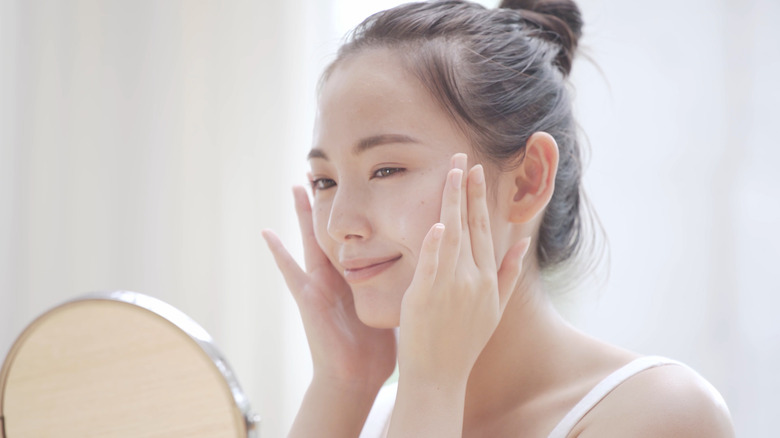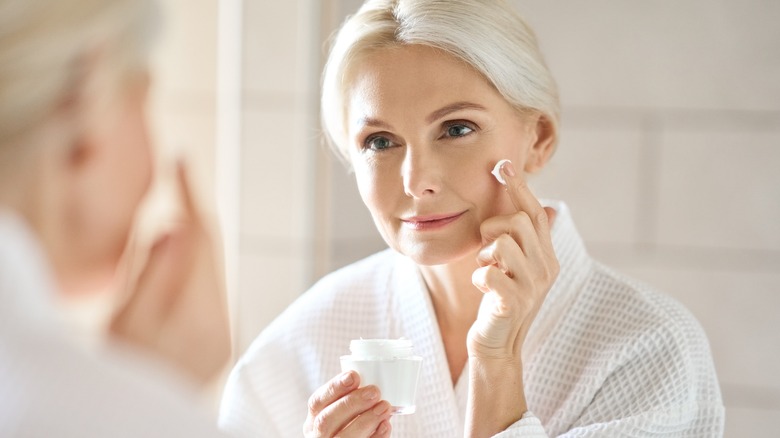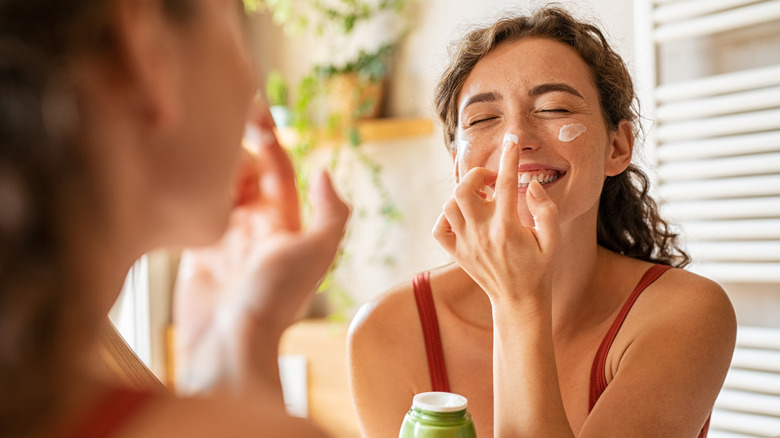Here's What A Celebrity Aesthetician Wants You To Know Before You Try Skin Cycling
It's always exciting to go shopping for new stuff because buying presents for yourself is guaranteed to make you feel good. While some of us are budding fashionistas who are always on trend, others are all about skincare. They are the first in a friend group to know about what's hot in the beauty world and will likely be the go-to person for advice and recommendations too.
Skinimalism blew up in 2020 when most of us were still quarantining at home during the COVID-19 pandemic, per InStyle. While some people streamlined their skincare and makeup routines, others started using way too many products, which caused issues they never had before, like inflammation. As a result, we started seeing an increasing amount of products with anti-inflammatory benefits.
"I think more and more people understand the anti-inflammatory aspect of life and that inflammation triggers problems with our overall health and causes skin dysfunctions," Barbara Sturm, founder of the namesake brand, told Vogue. While retinoids and chemical peels help promote a youthful complexion, overuse can lead to irritation, so the focus turned to fixing the damaged skin barrier.
Slugging was a major TikTok trend that kept skin hydrated and protected its barrier with an occlusive product, but it wasn't for everyone. As New York City-based dermatologist Camille H-Verovic explained to Byrdie: "I would not recommend occlusive ingredients to someone with acne." Now everyone is talking about skin cycling. Licensed medical aesthetician Amy Peterson spoke to The List about what it really means.
Skin cycling works on (almost) all skin types
Amy Peterson, a licensed medical aesthetician and the founder of Miami-based medspa, Skincare by Amy Peterson, has used her expertise and passion to transform clients' skin into its healthiest version, which is also the goal of skin cycling. As Peterson confirmed in an exclusive chat with The List, "Anyone can implement the skin cycling routine regardless of their skin type if they use a skincare product with a strong active ingredient." She clarified, however, "This is especially ideal for someone with sensitive or reactive skin because it reduces the risk of irritation."
Peterson added that since people dealing with acne, hyperpigmentation, or signs of aging typically use products with strong, active ingredients, this method works especially well for them because it means using different ingredients on different days, giving the skin some time to recover. However, the aesthetician warned that it's imperative you only use products "recommended by a professional, especially when it comes to skincare with strong active ingredients."
Peterson explained, "Most skincare products with strong active ingredients are designed and recommended to treat specific skin conditions or concerns." Moreover, consult with your dermatologist before trying skin cycling if you've been prescribed a strong active ingredient for daily use. Though skin cycling doesn't have any adverse side effects, if you have severe skin issues like painful cystic acne, using over-the-counter products in rotation may not alleviate it, and you're better off seeing a dermatologist, per USA Today.
Skin cycling allows for recovery time too
Skin cycling is a significant beauty trend that's going viral on social media, but it's actually not that new. As licensed medical aesthetician Amy Peterson clarified to The List, "The concept has been practiced by skincare professionals for many years." While many people think the more products they use, the better, that's not entirely true — in fact, it might actually cause more problems down the line.
Peterson told us, "Product cycling allows the skin to take advantage of active ingredients without overdoing it and causing irritation. For example, using retinol or a chemical exfoliant can lead to severe dryness, redness, and inflammation when used every single day." She added that skin cycling doesn't have any dangerous ramifications either. Still, it's wise to consult a medical professional to figure out which products to use, and how often, before proceeding.
It's worth noting, though, that according to the Daily Mail, even at weaker concentrations retinol can cause "redness, irritation, and dryness" if your skin is sensitive. Overall, skin cycling is great because it doesn't overwhelm your skin with too many ingredients at once while providing a routine where you use a chemical exfoliant on night one, retinoids on night two, and moisturizing products on nights three and four to let your skin heal and recover (via Byrdie). This way, you can benefit from all your products without overwhelming or potentially irritating your skin.


